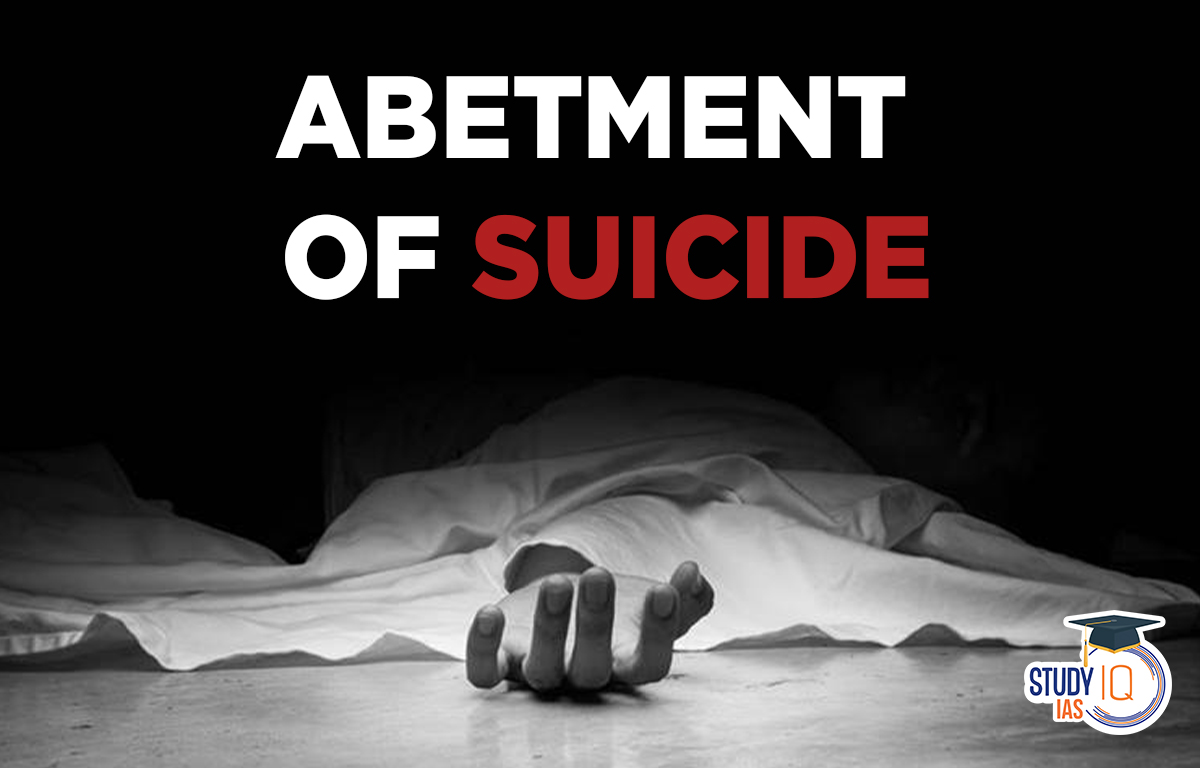Table of Contents
Context: Mumbai Police have arrested co-star of TV Actress Tunisha Sharma for abetment of suicide.
What is Suicide?
- Suicide is defined as an act or an instance of taking one’s own life voluntarily and intentionally.
What is Abetment of Suicide?
- Abetment is defined as instigating, engaging in a conspiracy or assisting in committing the offence. Section 108 of IPC defines who is an abettor in case of a suicide.
- Indian Penal Code, 1860 makes abetment of suicide a punishable offence. Under Section 306, abetment to suicide is punishable by either a jail term of up to 10 years or a fine or both.
Seriousness of Offence
- Abetment of suicide is tried in a Sessions court and is cognizable, non-bailable and non-compoundable serious offence.
- A cognizable offence is one in which an arrest can be made by a police officer without a warrant from a court.
- A non-bailable offence means bail is granted to the accused at the court’s discretion and not as a matter of right.
- A non-compoundable offence is one in which the complainant cannot withdraw a case even when the complainant and the accused have reached a compromise.
Abetment of Suicide and Murder
- Despite the intention of the accused to push a person to commit suicide, abetment of suicide is not the same as murder.
- The Supreme Court clarified this issue in the case of ‘Sangarabonia Sreenu v State of Andhra Pradesh’, in 1997.
- In a murder, the final ‘act’ of causing person’s death is committed by the accused, which is not the case in abetment of suicide.
How Does the Court Determine Abetment of Suicide?
- There are two ingredients that make up the crime of abetment of suicide. The first is a suicidal death and the second is the intention of the accused to abet such suicide.
- The evidence has to be evaluated to determine that death is a suicide. A death is termed suicide if the deceased person is understood to have known the probable consequence of their act of self-harm before proceeding to do it intentionally.
- Once a suicide determination is made, then the intention of the person accused of abetment of suicide is looked into.
- Exception: The only exception is that husband is charged guilty if his wife commits suicide within seven years of the marriage.
- This change was made to curb rising dowry deaths that were categorised as suicides.
What will be Considered an Abetment in Case of Suicide?
- In ‘Sanjay Singh v State of Madhya Pradesh’, the Supreme Court ruled that comment or a statement uttered in haste, anger would not amount to abetment of suicide.
- In 2017, the court ruled that that instigation, involvement of the accused must be connected strongly and any remoteness in connection would be insufficient to charge the accused with the offence.
- Instigation should have continuity, happen continuously over a reasonable period of time. The suicide must have taken place as a direct consequence of the instigation and cannot be a mere coincidence or very remote to the committing of suicide.
- In case the person dead by suicide is found to be very sensitive compared to a reasonable person, the court has said that the charge of abetment to suicide would weaken.
- Dowry case: In case a husband and his family have subjected the wife to continuous physical abuse since the marriage and drove her to commit suicide, they can be held guilty for the offence.


 National Technology Readiness Assessment...
National Technology Readiness Assessment...
 Justice Mission-2025: China’s Live-Fir...
Justice Mission-2025: China’s Live-Fir...
 Suryastra: First Made-in-India Long-Rang...
Suryastra: First Made-in-India Long-Rang...

























